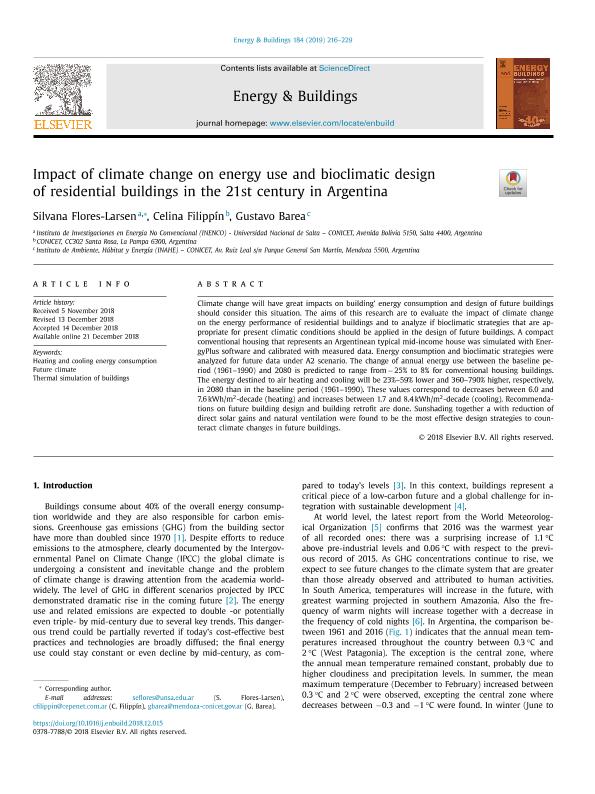Artículo
Impact of climate change on energy use and bioclimatic design of residential buildings in the 21st century in Argentina
Fecha de publicación:
02/2019
Editorial:
Elsevier Science SA
Revista:
Energy and Buildings
ISSN:
0378-7788
Idioma:
Inglés
Tipo de recurso:
Artículo publicado
Clasificación temática:
Resumen
Climate change will have great impacts on building´ energy consumption and design of future buildings should consider this situation. The aims of this research are to evaluate the impact of climate change on the energy performance of residential buildings and to analyze if bioclimatic strategies that are appropriate for present climatic conditions should be applied in the design of future buildings. A compact conventional housing that represents an Argentinean typical mid-income house was simulated with EnergyPlus software and calibrated with measured data. Energy consumption and bioclimatic strategies were analyzed for future data under A2 scenario. The change of annual energy use between the baseline period (1961-1990) and 2080 is predicted to range from − 25% to 8% for conventional housing buildings. The energy destined to air heating and cooling will be 23%?59% lower and 360-790% higher, respectively, in 2080 than in the baseline period (1961-1990). These values correspond to decreases between 6.0 and 7.6 kWh/m2-decade (heating) and increases between 1.7 and 8.4 kWh/m2-decade (cooling). Recommendations on future building design and building retrofit are done. Sunshading together a with reduction of direct solar gains and natural ventilation were found to be the most effective design strategies to counteract climate changes in future buildings.
Archivos asociados
Licencia
Identificadores
Colecciones
Articulos(INAHE)
Articulos de INSTITUTO DE AMBIENTE, HABITAT Y ENERGIA
Articulos de INSTITUTO DE AMBIENTE, HABITAT Y ENERGIA
Articulos(INENCO)
Articulos de INST.DE INVEST.EN ENERGIA NO CONVENCIONAL
Articulos de INST.DE INVEST.EN ENERGIA NO CONVENCIONAL
Citación
Flores Larsen, Silvana Elinor; Filippin, Maria Celina; Barea Paci, Gustavo Javier; Impact of climate change on energy use and bioclimatic design of residential buildings in the 21st century in Argentina; Elsevier Science SA; Energy and Buildings; 184; 2-2019; 216-229
Compartir
Altmétricas




